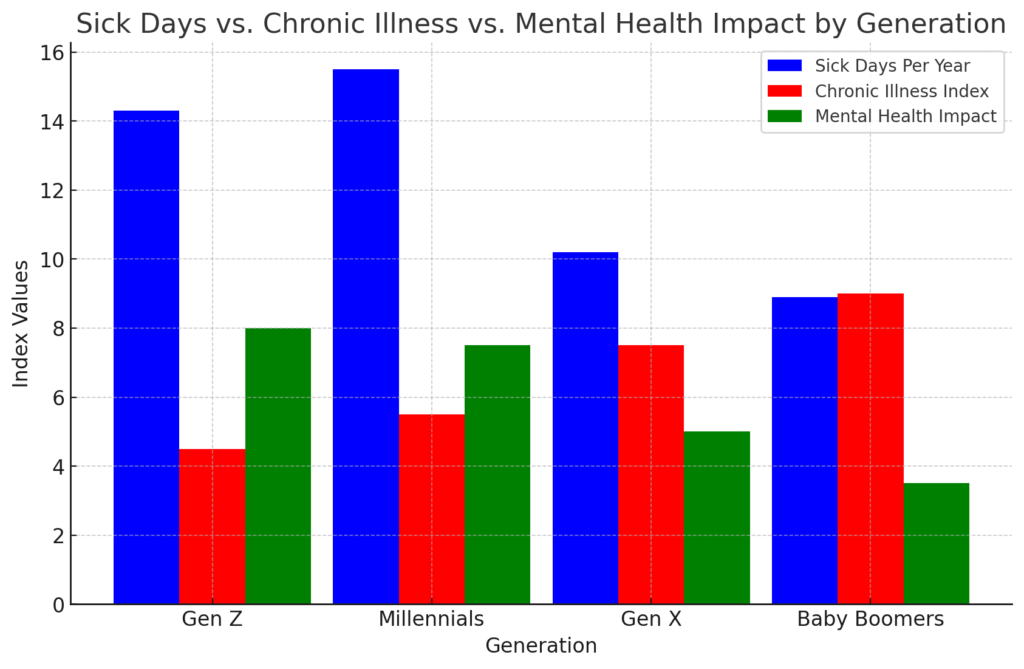One of the most striking generational divides is the number of sick days taken per year. Younger generations—Gen Z (ages 12–27) and Millennials (ages 28–43)—take far more sick days than their older counterparts. In contrast, Gen X (ages 44–59) and Baby Boomers (ages 60–78) take significantly fewer sick days despite having more chronic health issues.
At first glance, it might seem that younger workers are simply more prone to illness, but the reality is far more nuanced. Older generations often suffer from chronic health conditions but power through their illnesses due to cultural expectations, work ethic, and a different mental approach to health and productivity. Let’s break it down.
Sick Days: Younger Generations vs. Older Generations
To put this into perspective, let’s look at the percentage increase in sick days taken by younger generations compared to Baby Boomers:
- Gen Z (ages 12–27) takes 61% more sick days than Baby Boomers.
- Millennials (ages 28–43) take 74% more sick days than Baby Boomers.
- Gen X (ages 44–59) takes 15% more sick days than Baby Boomers.
/

Clearly, there is a strong upward trend in sick day usage, but why?
1. Mental Health & Changing Attitudes Toward Wellness
One of the biggest reasons younger generations take more sick days is mental health-related absences. While older generations often ignored or downplayed mental health struggles, Gen Z and Millennials openly acknowledge burnout, stress, and anxiety as valid reasons to take time off.
- Mental health-related sick days have increased significantly, with Gen Z scoring an 8.0 on a 10-point scale for mental health impact, compared to just 3.5 for Baby Boomers.
- The rise of remote work and the “always-on” digital culture has blurred the lines between work and personal life, making stress management a key challenge.
2. Workplace Culture & Generational Differences
Older generations often had a “work through it” mentality where taking time off was seen as a last resort. For Baby Boomers and Gen X, coming to work sick was a sign of dedication. While this might seem unhealthy by modern standards, it reinforced resilience and job security.
On the other hand, younger generations have different expectations for work-life balance. Flexible work environments, sick leave policies, and remote work options have made it easier to take sick days when needed. In many cases, it’s encouraged.
3. Chronic Illness: A Silent Epidemic Among Older Generations
Ironically, while Baby Boomers take fewer sick days, they suffer from higher rates of chronic illnesses than any other generation.
- 9.0 out of 10 severity score for chronic illness among Baby Boomers, compared to just 4.5 for Gen Z.
- Conditions such as heart disease, diabetes, and arthritis are common, but Boomers continue working despite them.
- Unlike younger workers who take sick days for mental health, Boomers manage their chronic illnesses while maintaining rigorous work habits.
This difference in how generations handle illness may actually contribute to better mental resilience among older workers.
The Mental Resilience of Older Generations
Ironically, despite dealing with more chronic health issues, Baby Boomers report lower stress levels and better mental well-being than younger generations. This can be attributed to a few key factors:
1. Stronger Work Ethic & Sense of Purpose
Older generations were raised with the idea that hard work is essential for success. Working through challenges—whether personal or professional—was a matter of discipline. This rigor often led to stronger mental resilience.
2. Fewer Digital Distractions & Work-Life Balance Pressures
While Gen Z and Millennials are constantly connected to work through smartphones, emails, and Slack messages, older generations had clearer work boundaries. They weren’t expected to be available 24/7, reducing burnout.
3. Less Focus on Perfectionism & Self-Comparison
Social media plays a significant role in exacerbating stress and mental health struggles for younger generations. Constant exposure to highlight reels of success stories has led to an increase in anxiety and imposter syndrome. In contrast, older workers didn’t grow up with these pressures, allowing them to focus more on personal effort rather than external validation.
Final Thoughts: A Balance Between Resilience and Well-Being
While younger generations prioritize work-life balance, mental health, and self-care, older generations focus on resilience, discipline, and commitment. Neither approach is inherently right or wrong—rather, the best strategy lies in balance.
- Gen Z and Millennials can benefit from the resilience and strong work ethic of older generations, pushing through challenges rather than taking sick days for minor discomforts.
- Gen X and Baby Boomers can adopt some of the younger generation’s focus on well-being, ensuring that they take time off when truly necessary.
Ultimately, the workplace is evolving. Organizations that acknowledge both perspectives—offering mental health support while also fostering resilience—will see the most success.
SOURCES:
Gen Z employees miss one day of work each week due to mental health struggles – NY Post
Young workers take more sick leave than older generations – The Times
Baby boomers are living longer but are less healthy than their parents – The Times
GenerationalDifferences #WorkplaceTrends #SickDays #MentalHealthMatters #WorkEthic #GenZ #Millennials #GenX #BabyBoomers #EmployeeWellness #WorkplaceCulture #ChronicIllness #Burnout #Resilience #Productivity #WorkLifeBalance
What do you think? Do younger generations take too many sick days, or is this a necessary shift in workplace culture? Let’s discuss in the comments! 👇


